By Enid Still, Sandeep Kumar, Irene Leonardelli and Arianna Tozzi
A two part series on the uneven experiences and everyday challenges of lockdown conditions in India. Reflections and insights from women and small-scale farmers, migrant workers and civil society activists in Tamil Nadu and Maharashtra point to a systemic blindness of the state and economic system, which fail to see, understand or respond to the struggles of the most marginalised people in the country.
Across the world critical voices are speaking out about the deadly impacts of government measures, which try to ‘slow the spread‘ or ‘flatten the curve‘ of COVID-19. There has been increasing concern about the impacts of the pandemic on global food systems in different parts of the world. In India, where the lockdown has been sudden and poorly planned, impacts on farmers and other food producers, such as fishing communities, have revealed both the social unevenness of lockdown conditions and the fragility of the current food systems. Commentators in India are reporting the unfolding of a twin crisis of pandemic and starvation as food supply chains are weakened, disproportionately affecting the poorer and marginalised sections of society.
The situation in India is tense and difficult for all sections of society but lockdown conditions have amplified social inequalities, particularly felt along the lines of gender, class and caste. The impacts on food systems and on the curtailed movement of people, which paradoxically has forced thousands of workers to migrate from cities, make visible socio-ecological entanglements, showing how particular social, political and ecological environments have influenced the scale and impact of the lockdown. In this two-part series we bring insights from both Tamil Nadu and Maharashtra into conversation, highlighting both the complexity of the lockdown conditions and the scale of the still unfolding crisis.
In this first part, we address the structural roots of the uneven experiences of lockdown conditions in India, bringing into question the dominance of patriarchal and market logics, which underpin the current food system. Narratives from fruit and vegetable farmers in Tamil Nadu articulate the fears and uncertainties different farmers face as the state struggles to support and communicate with agricultural communities. In part II, we present an interview with Seema Kulkarni and Sneha Bhat, two activists and researchers who have been on the front lines of the humanitarian crisis caused by the lockdown, supporting migrants and women farmers – some of the most marginalized groups in Maharashtra.
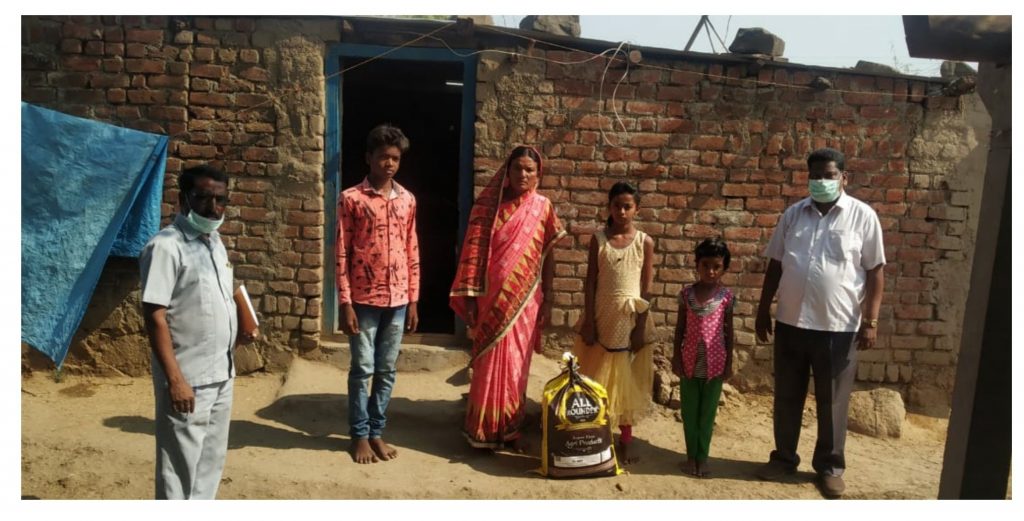
Families of women farmers during the lockdown in Maharashtra. Source: MAKAAM, twitter.com/MahilaKisan.
Everyday challenges of lockdown for Tamil Nadu’s farmers
Following the measures taken in China and Europe, India introduced a 21-day countrywide lockdown starting on 24th March, which was then further extended to 3rd May. The lockdown measures have curtailed people and industries; resulted in police violence in some parts of India; and have created uncertainty among marginalised communities who live on daily wages. Agriculture and food distribution were only added to the guidelines on exceptions through an addendum made by the Union Home Ministry on 27th March, contributing to confusion in different states about the enforcement of the lockdown measures.
Fruit and vegetable farmers in Tamil Nadu, who are expecting a high yield this season due to extended monsoon rains, know the urgency of this situation as they face not being able to harvest, transport or sell their crops. However, the confusion, fear and uncertainty they feel, much like farmers across the whole country, are not only a result of the COVID-19 lockdown. Rather, they are rooted in the invisibilisation of agricultural communities and the systemic devaluation of agricultural workers and their labour. Fear and uncertainty are an everyday, simmering reality for farmers who depend on a fragile economic system, dominated by capitalist and productivist market logics now coming undone under the COVID-19 lockdown. Alternative economies are possible however, and are already emerging as capitalist food systems weaken and farmers look to local, non-monetised and immediate forms of exchange.
Invisible labour, invisible suffering
Despite the integral role of farmers in sustaining food supplies and maintaining the economy, farmers in India – particularly women farmers – are invisibilised and undervalued. Similar to agricultural systems across the world, India’s neoliberal and market-orientated approach has created conditions where farmers are subject to volatile market conditions and often exclusive policies, which restrict their access to the very food they grow. Even farmers who are able to practice subsistence agriculture are often reliant on the market for seeds and other inputs.
Feminist academics and researchers such as Bina Agarwal, Sumi Krishna and Ranjana Padhi have highlighted how Brahmanical, patriarchial social structures (control over women to maintain patrilineal succession and caste purity) still permeate various levels of land governance in India, reproducing a social and state imagination of the farmer as an upper caste male landowner. Landless farmers, who are disproportionately women and Dalit (the term is used to describe sections of the Indian population, who are economically, politically and socio-culturally oppressed by Hindu society), are therefore often not recognised as ‘farmers’ by the state. This restrictis their access to rural welfare and livelihood schemes and other forms of relief. Making up over 80% of the agricultural workforce in India, these farmers face multiple levels of stigmatisation and violence when trying to cultivate, transport and sell their produce. Under the COVID-19 lockdown, these injustices are compounded through further exploitation by traders, no access to daily income and the movement of people and food being severely curtailed.
Farmers in India are therefore a community on the front lines of economic and environmental shocks. Farmer suicides, which have been a phenomenon across the country since the mid-1990s, are a visceral reminder of this. The unsustainability of green revolution farming practices and technologies, which remain widespread across the country are entangled with systemic marginalisation. For instance, persistent caste and gender inequalities, as well as mounting agricultural, dowry and medical debts, are reproduced partly due to enduring inequalities in agricultural systems and policies. There are also clear correlations between suicides rates and environmental and economic shocks, which result in farmers losing their crops or abilities to access labour or markets.
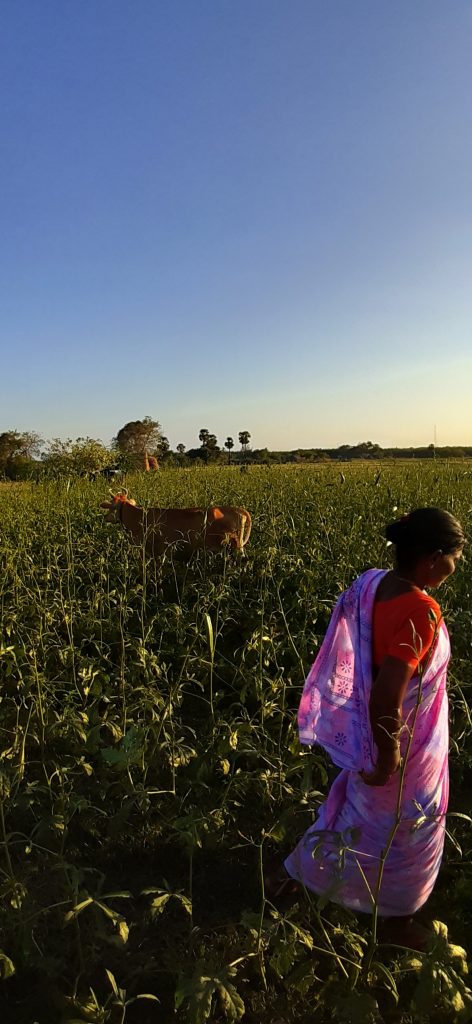
Farmer and cow in a field of ladies finger in Villupuram District, Tamil Nadu. Photo: Enid Still
Harvesting in times of fear and uncertainty
The lockdown has affected farmers of all crops and animal husbandry, as they are often interconnected and rely on the stability of national markets and supply chains. Farmers in sectors like poultry farming, livestock farming, horticulture, aquaculture and grain cultivation all suffer from state border closures, fear of police brutality, fear of contracting the virus and lack of labour for harvesting. Yet, like with any crisis, these effects are experienced unevenly. Whereas, grains such as rice, wheat, and millet can be stored and preserved, summer crops such as watermelon, muskmelon and cucumber cannot be stored for more than two weeks. Farmers need to make sure these melons reach traders before they become over-ripe and undesirable for consumers.
Murugan, a farmer in Chengalpattu District, Tamil Nadu, who we recently interviewed [interviewees have been anonymised] and who runs a nine acre family farm, describes the particular concerns of fruit farmers under lockdown conditions:
“Melons require heavy duty vehicles for transport since melons are sold to traders across India. Sometimes the loaded lorries have to cross several states until they reach their destination. Thus, these summer crops require heavier capital investment compared to other common crops. Even though it is difficult for marginal farmers to invest in melon cultivation, the profit is often promising. Therefore many farmers have invested their labour and capital in summer crops without anticipating the repercussions of the pandemic. Many farmers have taken high interest loans from loan sharks with a hope to repay after the harvest.
Currently the crops are near harvest but the farmers do not have access to any sort of transport due to the lockdown. Lorry drivers fear police brutality and other complications in travel and are therefore unwilling to cross borders. The few drivers who are ready to procure charge exorbitant fees and traders demand rock-bottom prices for melons, ten times lower than the usual market price.”
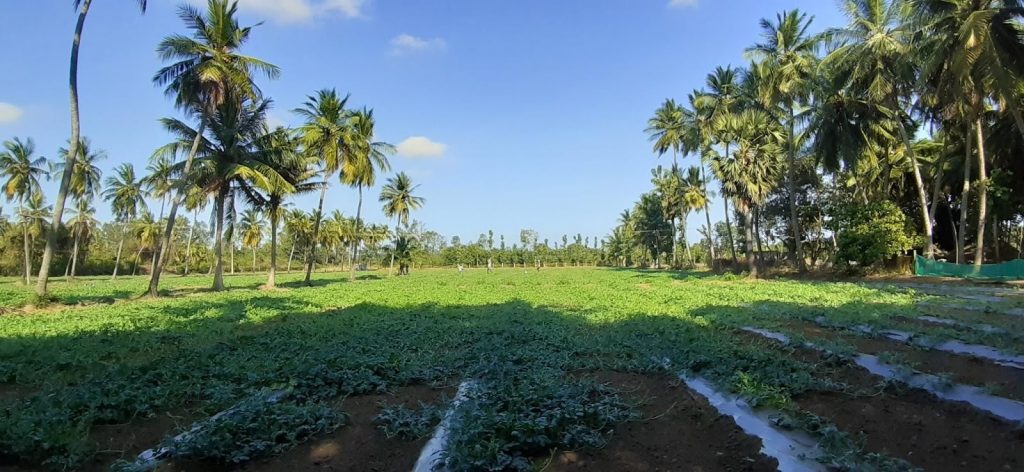
Melon field, Chengalpattu District, Tamil Nadu. Photo: Enid Still
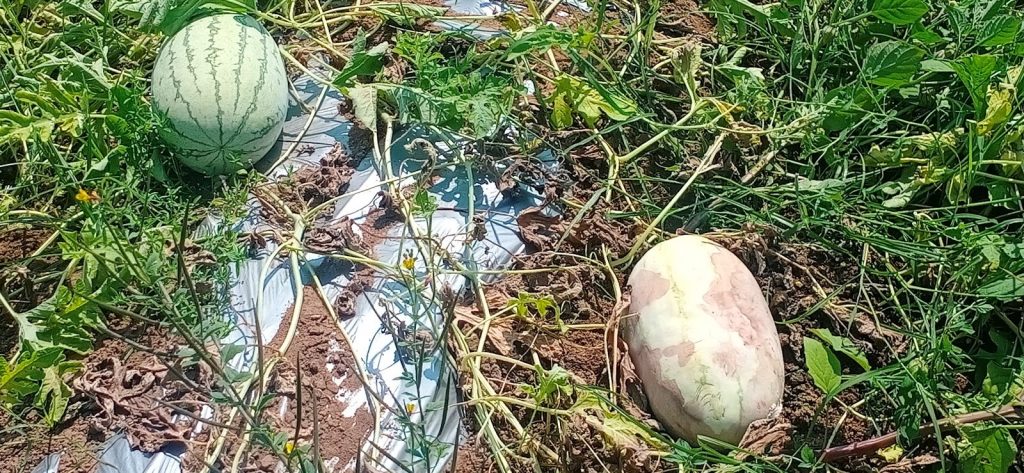
Rotting Melons in Murugan’s field in Chengalpattu District, Tamil Nadu. Photo: Murugan
As Murugan describes, farmers are stuck in a bind, facing either exploitative prices for their crops or leaving the harvest to rot in the fields. While consumers face increasing prices of food products, farmers have to endure the agony of huge financial losses. Traders and retailers, knowing the short time span farmers have to get their fruit and vegetables to the market, capitalise on this and the confusion under lockdown.
Alongside farmers such as Murugan, who represent small and medium sized farmers in India, there are also marginal farmers and agricultural workers, who rely on cultivating small areas of land and/or work as daily wage labourers on other farmers’ lands. Women farmers, who work both individually and collectively as part of a Farmer Producer Organisation (FPO) in the Villupuram district of Tamil Nadu face problems similar to those mentioned by Murugan. As a representative from the FPO described:
“The restrictions on movement mean that overnight the farmers have lost access to their daily income from both flowers and fresh vegetables, such as brinjal [aubergine] and okra. Those who can reach towns are unable to sell enough to cover the travel and have the added worry of police violence they hear about in the news and social media. Many of the women also cultivate groundnut and are in the middle of the harvesting season. Without the agricultural labourers, who are scared to leave their homes, much of the crop will be left to rot in the fields. Even if the crop is harvested, with no market to sell and lack of access to storage facilities, the women say the ground nuts will spoil either way. Those who have been able to approach local traders or retailers are met with low prices impossible for them to accept as they would not cover the transport costs, let alone the labour and other input costs.”
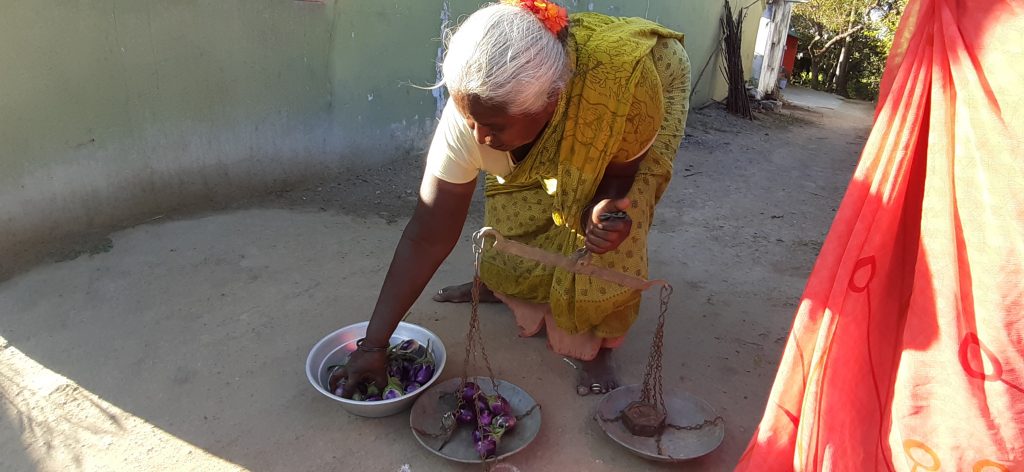
Farmer selling her Brinjal [aubergine] in her village in Villupuram District, Tamil Nadu. Photo: Enid Still
Countering fear and uncertainty through alternative supply chains
Currently some supply lines are open, and fresh food supplies are reaching the mandis [markets] in cities. However, these supply chains remain inaccessible for the majority of small-scale and marginal farmers, particularly in the rural areas where the vital public transport system, which connects remote villages and market towns is no longer operating. Information about mobility and pricing regulations under the lockdown are difficult for farmers to access, leaving them vulnerable to exploitation by middlemen and traders, as described by the women farmers in Villupuram District. Both fear and lack of information is being taken advantage of under the lockdown, reinforcing existing social inequalities and unjust pricing practices.
Unlike other types of economic or environmental shocks, the physical or social distancing and confinement measures taken to deal with this pandemic arguably add another layer of uncertainty. The social networks, civil society groups and local markets that are often able to support farmers by providing information and relief in times of crisis were initially curtailed, with people confined to their homes. Nevertheless, extensive efforts by NGOs and civil society organisations are being seen across the country.
In relation to agriculture and food, local social and economic networks as well as wider civil society networks are helping to distribute food supplies to those who have suddenly lost their daily income, thus buffering the shocks faced by farmers. In addition, collective farming models and practices, such as the FPO in Villupuram Distrcit, offer potential solutions to the unfolding impacts of COVID-19. As a registered corporation with institutional linkages, such organisations are able to offer financial and logistical support, connecting small-scale farmers to larger supply chain networks, which they may not have had access to otherwise. These networks do not only provide immediate relief but can potentially open up possibilities for local economies to function, preventing mass wastage of vital food supplies and huge financial losses for farmers.
The measures taken to prevent the spread of COVID-19 in India have therefore revealed not only the fragilities but also the injustices of a food system that devalues and invisibilises food producers. Conversely, these fragilities have also revealed the possibilities of locally negotiated economies, collective farming practices and non-market value orientated farming and trading systems. Instead of returning to ‘normal’ and allowing the increasingly visible injustices of the food system to be seen as a temporary fallout of measures deemed necessary to save lives, could this moment in time become a catalyst for reflecting on and working towards changing food systems in India and across the world?
Enid Still ([email protected]) is a PhD student in Feminist Political Ecology at Passau University, Germany, and a WEGO-ITN Marie Sklodowska-Curie Fellow, who has received funding from the European Union’s Horizon 2020 research and innovation programme under the Marie Sklodowska-Curie grant agreement No. 764908. Her research focuses on the politics and ethics of organic food relations with farmers and traders in Tamil Nadu from a feminist perspective.
Sandeep Kumar ([email protected]) is a socio-cultural anthropologist, currently working as a Junior Research Fellow in the TIGR2ESS project at M.S. Swaminathan Research foundation, Chennai, where he is conducting research on the livelihood changes of coastline farmers in Poompuhar, Tamil Nadu.
Irene Leonardelli ([email protected]) is a PhD student in Feminist Political Ecology at IHE Delft Institute for Water Education, in the Netherlands, and WEGO-ITN Marie Sklodowska-Curie Fellow, who has received funding from the European Union’s Horizon 2020 research and innovation programme under the Marie Sklodowska-Curie grant agreement No. 764908. Her research focuses on processes of agrarian transformation and water governance in Maharashtra from a feminist perspective.
Arianna Tozzi ([email protected]) is a PhD student in Human Geography at Manchester University, UK. Her research focuses on the intersecting impacts of climate change and development policies in drought-affected areas in Maharashtra from a feminist perspective.


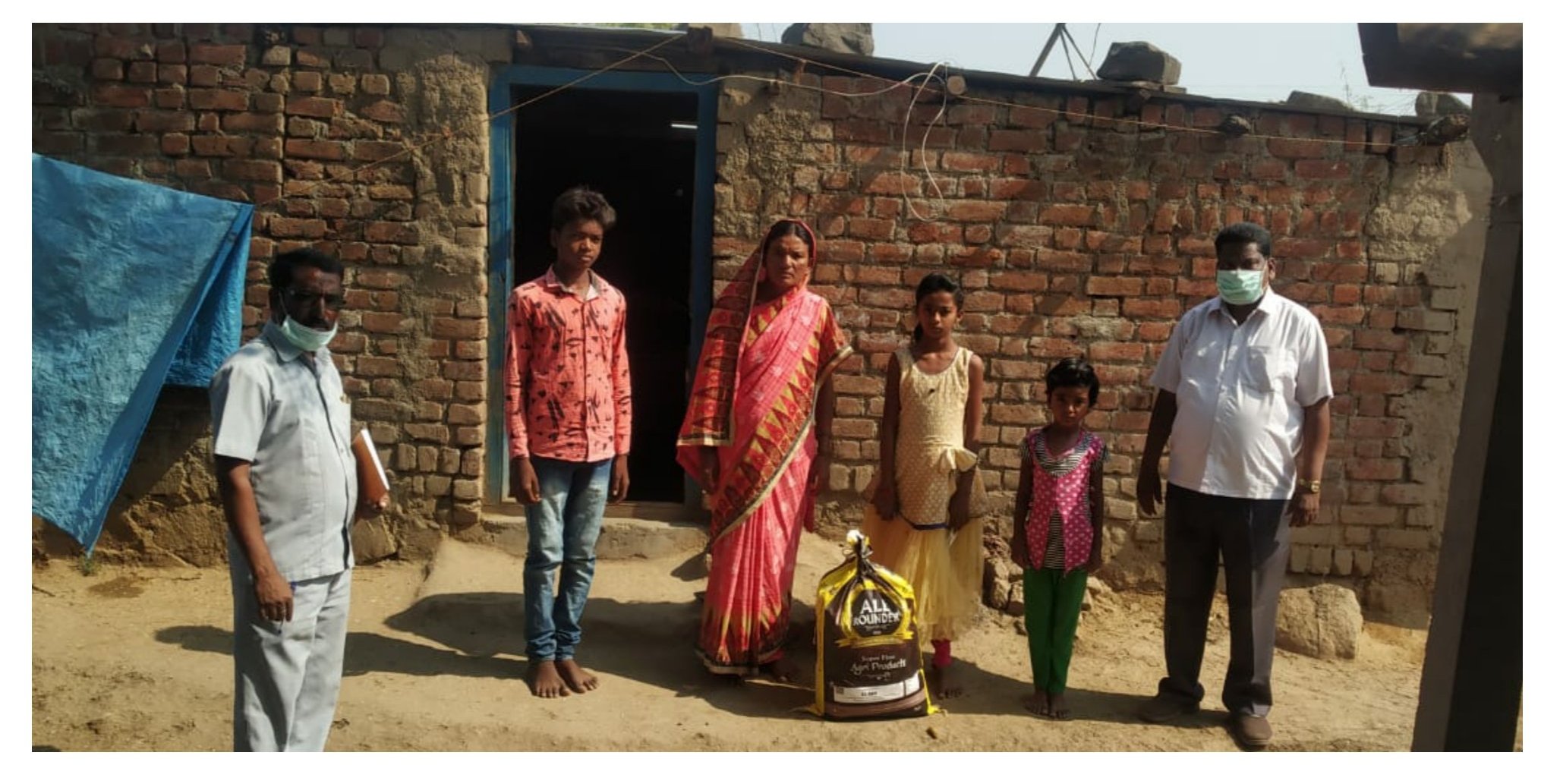


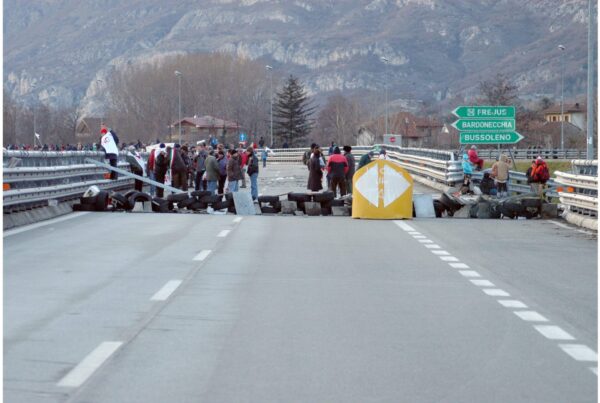

3 Comments